|
Brought to you by Dairy's Professional Development Organization®
|
|
Opportunities to learn...

WATER TOURS FEATURE BEST PRACTICES FOR FARMS, CITIES AND BUSINESSES and provide an opportunity to interact with a diverse group of stakeholders. With a focus on new technologies and innovations to protect water, the chartered bus will depart from Marshfield June 21 and stop at Marshfield Wastewater Treatment Plan, Eron Agronomics and Mullins Cheese. The June 22 tour will feature stops throughout the city of River Falls, followed by a tour of Ellsworth Creamery and the Dry Run Watershed. See the event
flier for more information and registration or call PDPW at 800-947-7379.
 DISCUSS RURAL LABOR IN THE TRUMP ERA AT A 'LUNCH N' LEARN'
with Erich Straub, an experienced immigration attorney who has worked with dairy producers for over a decade. He'll review changes the administration has already made and outline what's been proposed. Straub will outline what's reality versus what's rhetoric and the potential risks for dairy farmers. Sessions will be held from 11:30 a.m. to 2:30 p.m. on Tuesday, July 18 in Eau Claire and Wednesday, July 19 in Chilton. More details and registration information available here. DISCUSS RURAL LABOR IN THE TRUMP ERA AT A 'LUNCH N' LEARN'
with Erich Straub, an experienced immigration attorney who has worked with dairy producers for over a decade. He'll review changes the administration has already made and outline what's been proposed. Straub will outline what's reality versus what's rhetoric and the potential risks for dairy farmers. Sessions will be held from 11:30 a.m. to 2:30 p.m. on Tuesday, July 18 in Eau Claire and Wednesday, July 19 in Chilton. More details and registration information available here.
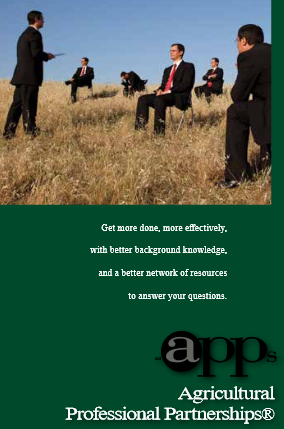
APPs TRAINING FOR NON-FARM PROFESSIONALS will provide a combination of classroom instruction and on-farm experiences to help non-farm industry professionals better serve their dairy-producer clients. Three modules will focus on the fundamentals of dairy science, crops, and dairy business management, and the sessions will be held July 25-27. Attendees will depart each day at 9:00 a.m. and return at 5:00 p.m. to the Crowne Plaza hotel in Madison, Wis. In addition to building valuable networks with farm owners and industry peers, participants will tour a high-performing dairy farm in the area for an up-close view of the facilities and systems modern dairy farms rely on. Learn more
here or call PDPW at 800-947-7379 for details and to register.
 MARK YOUR CALENDAR FOR A DAIRY DIALOGUE DAY™ TOUR MARK YOUR CALENDAR FOR A DAIRY DIALOGUE DAY™ TOUR in south-central Wisconsin. Participants will tour two high-performing dairies, engage in conversations with tour hosts and fellow dairy producers and return home with new and practical ideas and insights. The August 16 tour will depart from Prairie du Sac, Wis. and travel to Lodi for a stop at Wargo Acres, owned and operated by the Carncross family. After pen-side dialogue and discussion, the group will continue to the next stop at Blue Star Dairy, owned and operated by the Meinholz family near Middleton, Wis.
Space is limited to the first 50 dairy farmer registrations and the tour includes bus travel, refreshments and lunch.
Register online
for Dairy Dialogue Day™ or contact PDPW at 800-947-7379 with questions.
|
For your dairy... 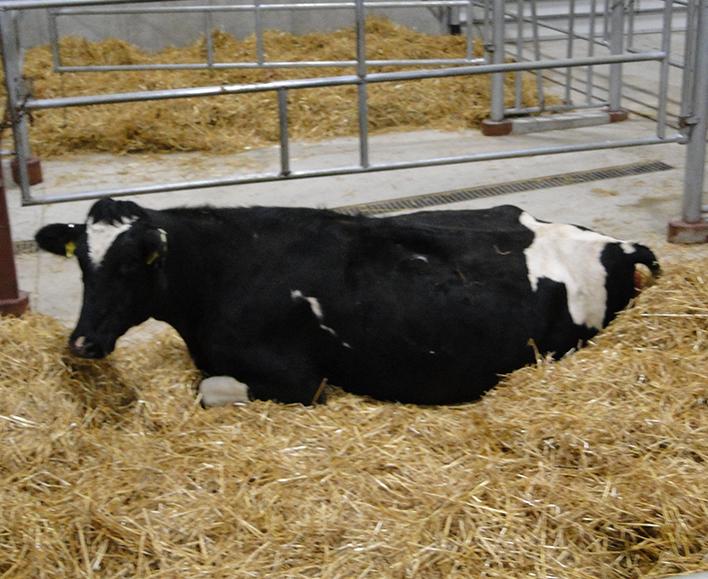
SHORTENING THE CLOSE-UP PERIOD COULD OFFER BENEFITS
alongside feeding a ration with moderate metabolizable protein (MP) levels, according to research in the Journal of Dairy Science. The study compared a conventional close-up period of 21 days with a shorter close-up period of 10 days. Cows were divided into three groups and received either high, medium or low MP diets and all received the same fresh-cow ration after calving. The length of close-up period did not affect dry matter intake or energy balance of cows, but cows in the conventional group had greater body weight changes during the three weeks leading to parturition. Cows fed a moderate MP ration ate 3.96 pounds (1.8 kg) more dry matter and yielded 7.43 pounds (3.37 kg) more milk than those on the lower MP diet, and yields of milk protein and lactose were higher. The data showed cows benefited from a shortened close-up period in conjunction with a moderate MP ration where dry matter intake, milk yield, and metabolic status was improved.
Click here
to learn more.
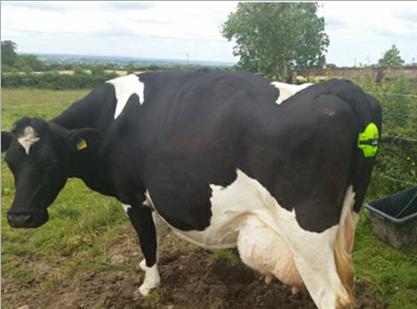
BEHAVIOR MONITORS COULD HAVE POTENTIAL IN PREDICTING CALVING
according to research inpress with the Journal of Dairy Science. Researchers used automated activity, lying, and rumination monitors to collect data on 53 Holsteins for 14 days before predicted calving dates. Monitors collected number of steps, lying time, standing time, number of transitions from standing to lying (lying bouts) and total motion, each in 15-minute increments. Data analysis and modeling was used to examine behavioral changes by day in the 14 days before calving. An analysis that combined variables from two technologies in two-hour increments was used to identify 2-hour periods in the 8 hours before calving with 82.8% sensitivity and 80.4% specificity. Changes in behavior and machine-learning alerts indicate that commercially marketed behavioral monitors may have calving-prediction potential. Learn more
here
.
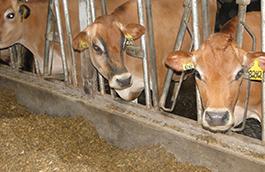
MEASURE PARTICLE SIZE IN TMR TO MAXIMIZE PHYSICALLY EFFECTIVE FIBER CONTENT
to boost milk production and milk composition. Using a Penn State Particle Separator with a 4-mm sieve allows farmers to conduct their own on-farm analysis of peNDF (physically effective neutral detergent fiber) in their total mixed rations. According to a University of Illinois publication, peNDF can be calculated by adding the total weight from the top three sieves and multiplying the total by the NDF content of the feedstuff. If this number does not match the predicted amount of peNDF for which the ration is formulated, farmers and nutritionists should reevaluate their mixing procedure. The order in which ingredients in the TMR are mixed is also important. Read the
full article.
|
Hit the road...
 SUMMER TYPICALLY BRINGS LONGER WORK HOURS to dairy producers, but it also brings an opportunity for more family time - especially with the kids. Over the next few months, we'll highlight a dairy farm or two that would make a good summertime destination, whether to tour their on-site facilities and creameries or to enjoy the cheese, ice cream, milk, gifts, and other dairy treats these businesses offer. SUMMER TYPICALLY BRINGS LONGER WORK HOURS to dairy producers, but it also brings an opportunity for more family time - especially with the kids. Over the next few months, we'll highlight a dairy farm or two that would make a good summertime destination, whether to tour their on-site facilities and creameries or to enjoy the cheese, ice cream, milk, gifts, and other dairy treats these businesses offer.
FELTZ DAIRY STORE
5796 Porter Drive, Stevens Point, Wisconsin
Feltz Family Farms, owned and operated by Ken and Jackie Feltz
Feltz Dairy Store features
a variety of dairy products, meats, and a number of other products mostly sourced from in-state producers. Learn more on their
Facebook page
or
web site.
|
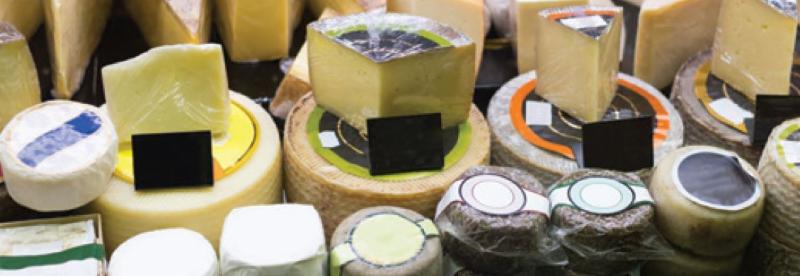 FOOD IS NOT JUST THE TOTAL OF ITS NUTRIENTS,
according to researchers. Traditionally, a food's impact on human health has been determined by the content of individual nutrients such as protein, fat, carbohydrates, and more. But newer research is showing that the health impact should be reviewed based on the whole product in addition to what else is eaten at the same time. For example, cheese has a lesser effect on blood cholesterol than would be expected based on saturated fat content. The research panel also noted that
yogurt and cheese have a different (and more beneficial) effect on bone health, body weight, and risk of developing cardiovascular diseases than would be expected on the basis of their saturated fat and calcium content alone. To learn more about the research read the Feedstuffs article
here
. FOOD IS NOT JUST THE TOTAL OF ITS NUTRIENTS,
according to researchers. Traditionally, a food's impact on human health has been determined by the content of individual nutrients such as protein, fat, carbohydrates, and more. But newer research is showing that the health impact should be reviewed based on the whole product in addition to what else is eaten at the same time. For example, cheese has a lesser effect on blood cholesterol than would be expected based on saturated fat content. The research panel also noted that
yogurt and cheese have a different (and more beneficial) effect on bone health, body weight, and risk of developing cardiovascular diseases than would be expected on the basis of their saturated fat and calcium content alone. To learn more about the research read the Feedstuffs article
here
.
 CHANGING DIETS IN CHINA AND FOOD-SECURITY NEEDS DRIVE U.S. EXPORTS.
Since 2012, China has become the leading market for U.S. ag exports, making up 16% of U.S. export value in 2016. These increased imports are part of the Chinese government's focus to reform agriculture which also includes market controls, improving farm efficiency, and curbing land loss. In addition, growing incomes and changing diets in China are driving demand for more diverse products and an increased focus on food safety. Consumer demand is strong for new products, especially those that have passed U.S. food safety regulations and are perceived to be healthy, particularly among higher income households in urban areas. Dairy imports, for example, increased after China's melamine food safety issue in 2008. Read more about the approaches that China's government is taking to address food security needs in this
Bloomberg News article
, and learn about export trends and opportunities
here
. CHANGING DIETS IN CHINA AND FOOD-SECURITY NEEDS DRIVE U.S. EXPORTS.
Since 2012, China has become the leading market for U.S. ag exports, making up 16% of U.S. export value in 2016. These increased imports are part of the Chinese government's focus to reform agriculture which also includes market controls, improving farm efficiency, and curbing land loss. In addition, growing incomes and changing diets in China are driving demand for more diverse products and an increased focus on food safety. Consumer demand is strong for new products, especially those that have passed U.S. food safety regulations and are perceived to be healthy, particularly among higher income households in urban areas. Dairy imports, for example, increased after China's melamine food safety issue in 2008. Read more about the approaches that China's government is taking to address food security needs in this
Bloomberg News article
, and learn about export trends and opportunities
here
.
|
For your business mind...
WORK WISELY AS TEMPERATURES RISE
to avoid heat stress, dehydration and other illnesses caused by heat. Dehydrated workers can become disoriented, weak or dizzy if they don't get help quickly, presenting a safety challenge for themselves and other employees. 
Here are a few tips for beating the summer heat:
- Drink lots of water - two to four cups every hour while working. Don't wait until you are thirsty; rather, drink small amounts of water frequently
- Wear appropriate clothing (light-colored cotton clothing, a wide-brimmed hat, sunglasses, etc.)
- Take breaks in the shade or air conditioning
- Schedule more labor-intensive tasks for early morning or late afternoon
- Seek medical care immediately if you or a co-worker have symptoms of heat-related illness.
Find more information and a link to other heat-related illnesses
here
. Also, download the
OSHA Heat Safety Tool
- an app that will calculate heat index
for a worksite and display a
risk level
to outdoor workers. Access to other safety and health information is also available at this site.
MAKE SAFETY A PRIORITY ON THE FARM THIS SUMMER. Farming can be a dangerous business for young and old alike, and now that the school year is over, a review of safety precautions is in order. According to the National Safety Council, agriculture is one of the most hazardous occupations in the nation.
Some of the most common health and safety hazards include access to chemicals, electricity, hand and power tools, highway and heavy equipment traffic, livestock, manure pits and ponds.

Four high-risk factors to assess on your farm:
- The age of those working, visiting, or living on the farm. Children and elderly are the most at-risk of injury.
- Equipment and machinery handling. Ensure all shields and protective gear are in place and well-maintained.
- Provide appropriate protective gear for each task. Gloves, coveralls, boots, hats, aprons, goggles and face shields offer protection that can save a trip to the ER
- Access to medical care. Many rural areas don't have quick or reliable access to medical care; being prepared with well-stocked first aid kits is important.
Find more information and resources here.
BRING OUT THE BEST IN MILLENNIAL (AND ALL) EMPLOYEES by recognizing they
have different expectations of the work experience than previous generations. For supervisors to bring out the best in this generation
, incorporate these eight tips into your routine:
- Dial up the relational component. An environment of disinterest can quickly destroy the enthusiasm of millennial employees - affecting the entire team.
- Communicate the "why" of any task or procedure.
- Adopt a conversation style that encourages desired expectations.
- Make supervisor-to-employee feedback something that's done all the time.
- Equip managers to become a coach who teaches workers how to be great employees.
- Satisfy and support drivers of employee engagement such as intellectual stimulation, growth and professional development.
- Value, support, and focus on the enthusiasm, confidence and optimism of youth. Don't crush it!
- Develop a customized employee experience.
Read more details for each of these practices in the full article
here
.
|
Meet fellow PDPW dairy members...
 |
|
 |
Dr. Brent Cousin, Dr. Bob Nagel and Dr. Tom Cully (l-r) |
HOLSUM ELM & HOLSUM IRISH DAIRIES
Combining environmentally sound practices with profitability has been the focus of Holsum Elm Dairy and Holsum Irish Dairy of Hilbert, Wis. since the dairies were started in 2001 and 2006. Veterinarians Bob Nagel and Kenn Buelow are co-owners with the Holsum family. Holsum Elm is managed by Dr. Brent Cousin and is home to about 4,500 cows as well as the calf ranch where about 2,000 calves from both farms reside until seven months of age. Holsum Irish, managed by Dr.Tom Cully, has 4,000 cows.
Manure pits were built with an industrial standard of 14 months' storage to contain all runoff, ensuring that manure can't reach groundwater. Corn silage and haylage are stored on a 6-acre concrete pad that slopes to a sump to collect leachate and debris; it's then collected and pumped into the pit. From there it goes into an anaerobic digester to create methane gas to produce electric power - enough to generate electric power for about 900 residences.
Once manure solids and liquids are separated, dry solids are reused for bedding and the liquid is applied to cropland as fertilizer via draglines or truck-spreading. Because feed for the cows is grown by local farmers and Holsum Dairy does not own cropland, manure is sold to area farmers who fertilize their own crops.
Cows are milked by four employees per shift in an 80-stall rotary parlor. Proper training and goal-setting for milk quality are a priority for the milking team and an in-house milk quality lab allows workers to test for antibiotics as well as determine pathogen type before treatment.
In total, 90 employees -
including a mix of local residents, Hispanic, college- and tech-school-educated employees - make Holsum Elm and Holsum Irish the sustainability-oriented operations they are. The dairies have been recognized with numerous awards and are participants in the Green Tier Program overseen by the Wisconsin DNR. In line with their mission to maintain a good working relationship with the townships and farm neighbors, they've been a farm host for PDPW's Agricultural Community Engagement (ACE) on-farm twilight meeting, which serves to welcome town and county officials and community members to the farm for tours and discussions about mutual needs and concerns.
With ongoing education at the forefront of Holsum's business model, employees and managers have attended various PDPW programs. Topics such as human resources, herdsperson training, calf care and parlor management have allowed members of the Holsum team to build upon their practical knowledge base. Other management-level programs Holsum employees have attended include PDPW's Managers Academy, Business Conference and Visible Voice Crisis training sessions.
Nagel makes a point to attend PDPW conferences and training events for the purpose of continual learning. He also says, "I appreciate the promptness of their meetings.They get to the point so we can return home on time."
|
"We all have possibilities we don't know about.
We can do things we don't even dream we can do."
--- Dale Carnegie
|
|
A BIG Thank You...
TO OUR PDPW SPONSORS who
support continuous improvement for the dairy industr
y.
T
hey believe in producer leadership and place a high value on lifelong
education for those involved in the dairy industry. We deeply respect their commitment to PDPW and the members we have the honor to serve.
Along with our Mission Sponsors, our Corporate and Event Sponsors continue to invest and build a strong industry. If you interact with any of these companies, please thank them for supporting PDPW!
If you or a company you know is interested in participating as a sponsor, please contact one of our team members at
[email protected]
or call 800-947-7379.
|
|
PDPW Education Calendar
| June 21 |
PDPW Water Tour: Marshfield, Wis. area
|
| June 22 |
PDPW Water Tour: River Falls, Wis. area
|
| July 18 |
Lunch N' Learn with attorney Erich Straub: Eau Claire, Wis.
|
| July 19 |
Lunch N' Learn with attorney Erich Straub: Chilton, Wis.
|
| July 25-27 |
Agricultural Professional Partnerships (APPs): Madison, Wis. area
|
| August 16 |
Dairy Dialogue Day Tour: Lodi, Wis. and Middleton, Wis. |
STAY CONNECTED
800-947-7379
|
|
|
|
|